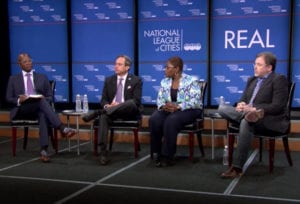Who is a member?
Our members are the local governments of Massachusetts and their elected and appointed leadership.

In August 2015, NLC CEO Clarence Anthony hosted a discussion, “Undoing Racism in America’s Cities,” with panelists Karen Freeman-Wilson, mayor, City of Gary, Ind., Tim Wise, author and anti-racist activist, and Matt Zone, councilmember, City of Cleveland, Ohio, and 2nd Vice-President, NLC. (Source: YouTube)
In a column published on June 12, Clarence Anthony, CEO and executive director of the National League of Cities, urges local leaders to seize this moment “to re-examine our institutions and systems” and broadly address racial bias.
The National League of Cities, he writes, “is dedicated to working alongside our municipal leaders as they begin to right the wrongs of America’s long history of structural and institutional racism.
“Local leaders need to step into the uncomfortable – and ask tough questions of themselves and their staff about how they will remove long-standing racial biases and inequities.
“One of our immediate next steps will be to dive deep into the data of racial inequities and work on partnerships to put best practices and resources where those inequities lie.”
Read the full column below:
By Clarence Anthony
June 12, 2020
Racism is destroying the infrastructure of America. But let’s be clear – this issue is not new. It has been heightened and soon thereafter forgotten countless times in our nation’s history by people in positions of power. This time needs to be different; we have a unique opportunity to re-examine our institutions and systems, and the chance to rebuild them from the ground up in a way that applies a racial lens to ensure our policies are inclusive.
The National League of Cities is dedicated to working alongside our municipal leaders as they begin to right the wrongs of America’s long history of structural and institutional racism. Building equitable communities requires reviewing and changing existing policies, practices, and procedures in all governmental institutions through the lens of equity. Local leaders need to step into the uncomfortable—and ask tough questions of themselves and their staff about how they will remove long-standing racial biases and inequities.
The first step is to hold ourselves accountable for past decisions and recognize that local, state, and federal leaders have directly authorized actions that have disproportionately impacted Black, Indigenous, and People of Color in this country negatively – and more specifically, data consistently shows us that Black people are at highest risk. From infant mortality to life expectancy, race is the strongest determinant of one’s success. This is the reality that we can’t keep turning away from or denying.
More than five years ago, NLC created its Race, Equity And Leadership department (REAL) to provide resources, technical assistance, toolkits, and information to local leaders on how to create more equitable and safe cities for ALL Americans. REAL has been deeply enveloped in this space, and the COVID-19 pandemic, and international uprisings have caused us to take a critical look at the work we have achieved and where we have fallen short.
The responsibility does not rest solely on the backs of local leaders. It will not be just local governments; it will take corporations, community organizations, state and the federal government’s partnership to make sure we actualize the unalienable rights to life, liberty, and the pursuit of happiness that Black, Indigenous, and People of Color have not had for generations.
In a state of heightened emotion, it is imperative we ground our investments and strategies in evidence-based best practices and data. One of our immediate next steps will be to dive deep into the data of racial inequities and work on partnerships to put best practices and resources where those inequities lie. We have a unique perspective to carry out this research and quickly connect partners with communities to drive measurable change.
We are committed to embedding race, equity and leadership into the fabric of all our work and build an equitable future for all, where every community member can thrive regardless of race, gender, sexual identity, orientation, or ability.